One of the most beautiful periods in a woman’s life is pregnancy, the time of waiting to meet her child. But during this period, the mother experiences not only joy, but also suffers from severe symptoms of toxicosis. In addition to nausea and dizziness, belching during pregnancy, which often appears already in the first trimester, causes a lot of inconvenience. This condition occurs in many women and is not usually considered a pathology. However, there are exceptions. Therefore, you should definitely consult a doctor.
Causes of belching in pregnant women
The appearance of belching during pregnancy is quite physiological. Immediately after conception, the functioning of almost all vital systems changes. The female body begins from the first days to prepare for the upcoming pregnancy and childbirth. In most cases, unusual, often uncomfortable sensations occur. Their intensity is often influenced by the anxiety of the expectant mother and anxiety for the health of the child. And belching itself, or the return of gaseous and liquid stomach contents into the oral cavity, is provoked by the following factors:
- compression of internal organs by the growing uterus;
- frequent hormonal fluctuations;
- expansion of the circulatory network;
- changed eating habits;
- psycho-emotional instability.
A discomforting sensation may be a consequence of physiological changes in the endocrine glands and metabolic processes. Due to metabolic disorders, intermediate products enter the blood from tissues, causing toxicosis.
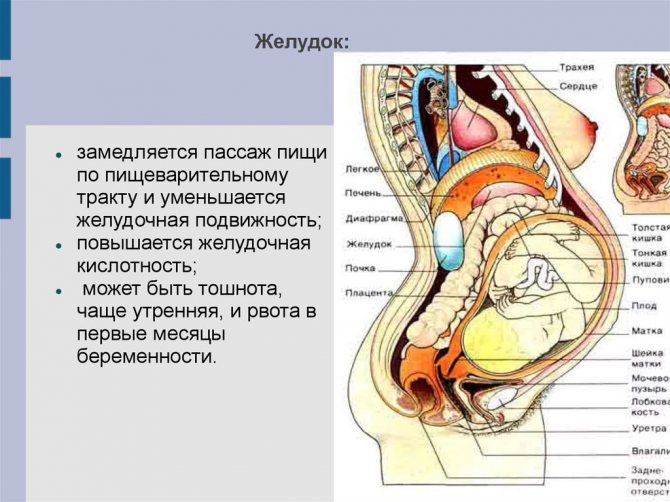
The cause of the accumulation of gases in the stomach is also a deficiency of vitamins, micro- and macroelements due to the “robbing” of the mother’s body by the fetus. In such cases, additional intake of balanced complexes for pregnant women will help to cope with the problem.
Features of the problem at different times
Belching during pregnancy may disappear for a while and then appear again. Often women note its occurrence only in a certain trimester. Some suffered from discomfort in the early stages, others - before childbirth.
First trimester
Belching can be a sign of pregnancy even before your period is missed. In the early stages, the level of progesterone in the body begins to increase, which increases blood circulation and accelerates metabolic processes. It also often leads to toxicosis - a disruption in the process of adaptation of the female body to pregnancy. There are several theories of its development, but doctors are inclined to think that placental chorionic gonadotropin, lactogen and progesterone are to blame. A sharp change in hormonal levels leads to a deterioration in a woman’s condition and well-being. It is further aggravated by tearfulness, often causeless anxiety and worry.

On a note! The appearance of nausea, vomiting, and belching in pregnant women in the early stages is dangerous due to the fetus not receiving enough nutrients. Such symptoms usually occur within 2 months and often require medical intervention.
Second trimester
Belching during pregnancy in this trimester is caused by a growing uterus and significant weight gain. Pulling, aching pain in the lower back, which occurs for natural reasons, becomes more frequent. They significantly complicate the life of a woman who is forced to spend time in bed instead of useful walks in the fresh air.
Both a sedentary lifestyle and an increased appetite lead to weight gain. Problems arise with digesting food, it stagnates in the stomach. The cause of the accumulation of gases is the development of putrefactive, fermentation processes. In the second trimester, internal organs shift towards the diaphragm, which contributes to an increase in abdominal pressure. This is not accompanied by any special symptoms, but may be observed: sour belching, bloating, heaviness after eating, heartburn.

Third trimester
Various factors can provoke belching during late pregnancy. The size of the uterus and the weight of the fetus increase, which causes narrowing of the hollow organs of the gastrointestinal tract. The hormones necessary to prepare the birth canal begin to be produced.
During this period, toxicosis usually subsides, so the woman eats more. She also develops special eating habits - for 1-2 weeks she only wants sour, sweet and salty foods. It is not surprising that the digestive system is under increased stress. And she reacts to them with belching, heartburn, and flatulence. In the third trimester, many women are forced to take calcium supplements. This macroelement can provoke the accumulation of gases in the stomach and heartburn.
burping air during pregnancy
This post has been a long time coming. Now I'm ready to write about it. If you are one of those people who are not ready to adequately perceive their mistakes and learn not to repeat them, then you should scroll on. For the rest, welcome to cat. Perhaps my mistakes will help you correct yours.
What is colic? Why doesn’t eating cabbage and peas affect them and why can’t they happen “again” and “again”? Colic, as Wikipedia and smart men and women tell us, is an imperfection of the child’s digestive system. For nine months the body was fed through the umbilical cord, and then there was such stress, oral nutrition. It’s not so easy to readjust, the nervous system is in shock, and as statistics say, the nervous system of boys is more often in shock, but we are not interested in statistics. To make it completely clear, I’ll explain with a simple example: Baby teeth. They fall out. Whatever you do. No matter how much you take care of them, no matter how much you care for them, no matter how much you protect them, they will fall out. This is fate))) This is nature. This is how it was intended and only momentary glue can fix it, and then not for long. So it’s the same with colic. Not in the sense of glue, but in the sense that nothing will help you. Now I will tell you a terribly sad fact. If a child has them, then no matter what you eat, no matter what medicines you give him, no matter what tambourine you jump with and no matter what gods you pray to, nothing will help. You will have them. But I hasten to please you: real colic is not as common as baby teeth and most likely you don’t have them. Especially if some medicine or a tambourine helps you, then you definitely do NOT have colic. Perhaps this post is not about you, and you really have them, and if you and your doctor are 120% sure of this, then I will not convince you of this. You still have no choice. Wait until three months and try to sleep when the baby sleeps. For everyone else, let's continue. Neither cabbage, nor eggplant, nor a glass of milk, nor a plate of peas and chocolate cause colic. Who doubts: re-read the post again from the beginning. The mother's diet does not affect colic. It also does not affect gas, which is so often mistaken for colic. In order to understand why it doesn’t have an effect, let’s turn again to smart uncles and aunts and encyclopedias. How is milk produced? Anyone who knows the answer can skip the next video, you already know that it has no effect. Let's watch the rest carefully. The girl explains it very simply and clearly.
Why does a child have gas? The answer is very simple, think about what it is! This is air in the intestines. It is caused either by fermentation in the intestines or was received from outside, that is, the child swallowed air. Fermentation is excluded if you feed your baby normally and he has time to digest the previous portion of milk before you breastfeed him again. There are no other reasons for fermentation; he does not eat foods that can ferment. We figured it out, in this case we feed less often. Often the baby asks for the breast not because he is hungry. But because he’s bored, wants tenderness, or he’s sick. There is also this thing called the sucking reflex. This is akin to severe drug addiction. I want to. Well, I really want to suck. This is not a need for all babies. But if you have just such a drug addict, then buy a pacifier. I was an ardent opponent of nipples until my daughter started hanging on her chest just like that. Of course, she sucked milk without being hungry, and as one would expect, she received a new portion of milk without digesting the previous one, fermentation began and, as a result, gases. The pacifier helped. This was the first step towards a reasonable mother from a “stupid” mother. Shove your principles far away and don’t remember them. Much more will not be as you imagined and planned when you were pregnant. Stop feeding your child unsystematically and chaotically. Learn to listen and understand him. Feeding on demand and chaotic feeding are two different things, remember this! Perhaps your problems with colic are over now. If not, then read on. So the second main cause of gas. Incorrect attachment to the breast. Only a few mothers are fed correctly. For example, I still don’t know how. And not because I have my first child. And you most likely don’t know how to do whatever you think about yourself. Even if you have a fifth. And not because we are so crooked and slanted. It is very difficult to simply achieve an ideal pose, at the right angle, a calm child who is not in a hurry and does not behave like a starved leech after six months of hibernation. I’m more than sure that most of you don’t have special feeding chairs with footrests that help you sit up anatomically correctly, and half don’t even have special pillows for feeding. But this problem can be solved. If the child squirms on the chest, throws the nipple and cries, before sounding the alarm that the unfortunate one cannot tolerate your milk and crying about “not enough milk”, lift the child in a column for 5-7 minutes and pat him on the back, give him the opportunity to release the air. Not once after feeding, but several times during feeding. Moreover, it is inappropriate to throw the child over the shoulder, squeezing the unfortunate intestines and expecting regurgitation. Just hold it vertically, pressing it slightly towards you and stroke its back in a circular motion. Remember: spitting up and burping are two different things! We are interested in burping! Well, some of you have just successfully gotten rid of colic. And now about when you are really to blame for the fact that your milk harms your baby. No, not about when you are full of cabbage and peas. And about when you worry about this. It is unlikely that you, especially with your first child, are able to maintain angelic patience and divine peace. Most likely you are overwhelmed with emotions, excitement and... Adrenaline. So it goes into the milk. And so he doesn’t need him for the calm development of the baby. So, if a diet during breastfeeding helps you achieve peace of mind and confidence that you are doing everything right, then follow it! This is almost the only reason not to eat certain foods. Cabbage will not add adrenaline to your blood, but you will certainly worry about the fact that you ate it! So don't be nervous. We eat everything and drink lemon balm tea, on special occasions we quietly drip a little valerian. We brainwash dull dads that they are obligated to create a worry-free life for you (and better forever and not just for the period of the guards). And now again some of you have been saved from unknown ailments. I do not take into account specific intolerance to certain substances (substances, not products!!!) as well as real allergies. If you actually had tests done and an allergen was identified, then that’s a completely different story. But it is naive to believe that every second person is allergic to bread, apples or buckwheat - no need. Admit to yourself that you are covering up ignorance with an easy explanation and intend to treat the child for what he does not have. And, lo and behold! This sometimes even helps! Why? Because, as I already explained, you calmed down and your body stopped producing adrenaline. And now about the most unexpected reasons why your child cries. We all know that newborns sleep, eat and poop. This is exactly the order. And nothing more. When my daughter was born, I was convinced that this is how it is and nothing more is unnecessary. For the first couple of weeks, she actually did just that. But only the first couple of weeks. And then the screams started. And if I attributed the evening screams to colic, I couldn’t explain the daytime screams. The child is fed, in a clean diaper, dressed comfortably, warmly, not hot, why didn’t she want to sleep and screamed???? Here I once again overcame the “fool” mother within me. She didn't want to sleep. She didn't want to sleep. At some point it dawned on me. She wanted to communicate! Walk around the room, scratch your tummy, look at the rattle... But don't sleep. So why did I lull her to sleep? She just screamed more and more. She screamed hysterically, squirmed and twisted. as if something was hurting her. The first time I heard it. Since then, we have almost no tears or hysterics. I just do what she asks. I put her to bed when she is tired, and if I need to do it at a certain hour, then I try to make her tired by that time))) If she wants to communicate, we communicate. If she wants to lie down in peace and quiet, I leave her there. I no longer force her to do what I wanted, I learned to hear her. And if in the evening she wants a massage and chat, then that’s what we do, and we postpone sleep until later. My daughter sleeps 11-13 hours a day. Some will say that this is not enough at her age (1.5 months), but this is 13 hours of good sleep, without tears, hysterics and yelling. The waking time was clearly distributed, at first I listened to her, then I thought about how convenient it would be for me and tried to find a compromise. Now we have an almost good regime that suits both of us. It is not accurate, it floats within + half an hour, because I wait for her to wake up and for her to want to sleep again. We play with rattles as long as she wants, and if she starts to whine, we quickly change the scope of activity. She almost stopped crying. We solve tummy problems with massage, the droplets from the gases have moved to the far shelf and are forgotten, we try to eat calmly and as correctly as possible and minimize the problem of gases. Sleep problems are gradually starting to disappear. Having waited until she is tired and wants to sleep, just put her comfortably and she falls asleep. We begin to sleep in our own bed, which at first seemed almost impossible. Almost every day one nap already passes without problems without the presence of mom or dad. We finally started using the babyphone. Listening to your baby is what helps cure the problem of seemingly inexplicable crying, which in fact has nothing to do with colic. Not everything is perfect yet, but we are already on the right track. I'm on the path to understanding my child as an individual and respecting his wishes, because my daughter is not just a cackling baby. She is human. Let's stop looking for diseases that don't exist. Let’s stop using “grandmother’s” methods, folk sayings instead of scientific facts. Let's learn to understand our children, instead of inventing imaginary illnesses for them, thereby covering up our stupidity.
Types of burps
Belching during pregnancy appears mainly after meals, especially fatty ones, flavored with spices.
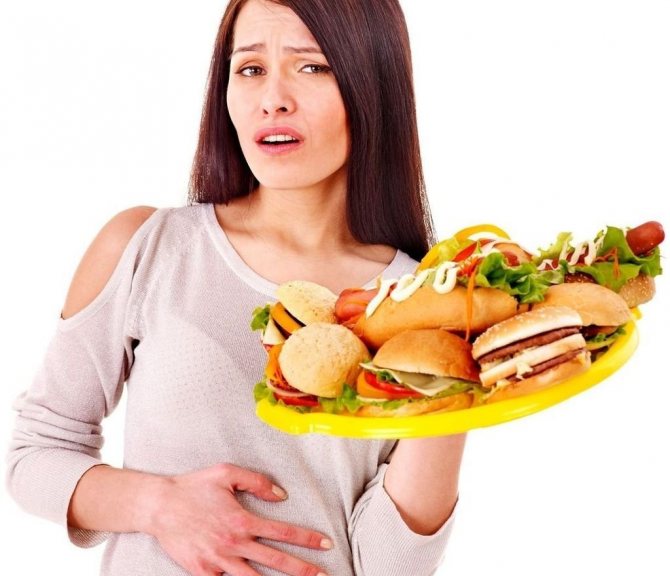
Based on her character, doctors determine whether the woman should prescribe medications or whether intervention is not required:
- The appearance of air belching during pregnancy is considered a physiological condition caused by nutritional errors. It usually goes away on its own and does not require taking pharmacological drugs;
- If you belch bile during pregnancy, consult a doctor. It may indicate problems with the biliary system, pancreas, functional insufficiency of the pylorus and reflux of bile into the stomach;
- sour belching of food during pregnancy also sometimes indicates a developing pathology. It is characteristic of gastroduodenitis with increased production of hydrochloric acid, gastroesophageal reflux. Accumulation of gases is also observed during fermentation of the stomach contents due to insufficient secretion.
There is also egg belching during pregnancy. If the smell of rotten eggs is felt when air is released, then there is a high risk of developing diseases or exacerbating existing ones. When the patient complains about the rotten taste of the regurgitated masses, doctors note a long-term stagnation of food. This is a sign of impaired secretory or evacuation function, typical of atrophic gastritis, pyloric stenosis, and gastric cancer.

But you can relieve the symptoms using simple methods:
- We don’t take antispasmodics! They will cause even more serious relaxation of smooth muscles. Use only medications prescribed by your doctor.
- We eat in small portions.
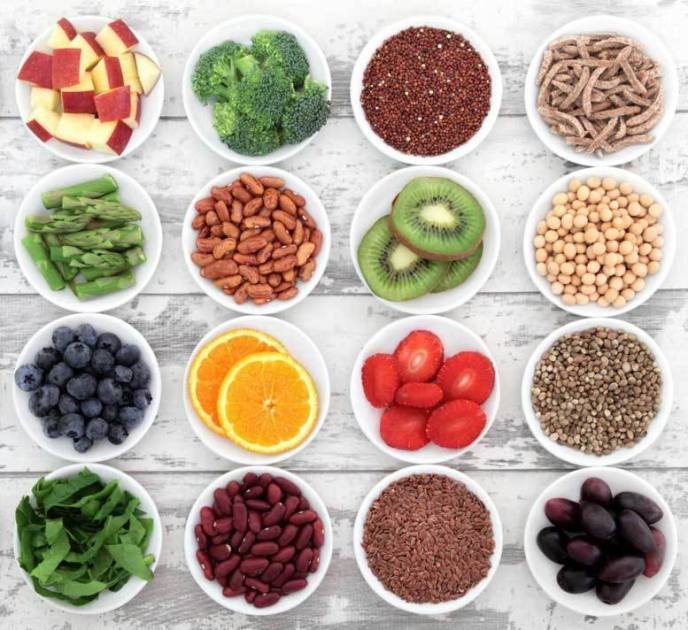
- We put tight things in the closet that can squeeze the stomach. We choose loose clothes.
- We don’t bend over – we carefully squat down.
- After eating, we do not lie down - we need to avoid a horizontal position for at least 30-60 minutes.
- Let's eat right! We give dinner, which can cause increased production of stomach acid, to the enemy.
- We exclude from the menu sour foods, any soda, strong coffee, as well as spices and herbs/marinades . In addition, we limit the consumption of such products from vegetables, berries, fruits and fermented milk (tomatoes, kefir, etc.). Eggs, yeast dough products, and fatty meats can also cause heartburn.
- We don't eat enough at night. Eat a couple of hours before bedtime and don’t forget about half an hour of activity after eating.
- During pregnancy, we take a higher pillow and sleep on our back.
Associated symptoms
Pregnancy greatly increases the stress on a woman’s body. The expectant mother listens carefully to her feelings and tries to analyze what is happening in her body. If the appearance of nausea and belching during pregnancy usually indicates toxicosis, then other symptoms are quite alarming. Typically this is:
- Flatulence, bloating.
- Nausea, sometimes vomiting.
- Heartburn, bitter taste in the mouth.
- Impaired intestinal motility: diarrhea or constipation.
- Pain in the epigastric region.
Belching and heartburn during pregnancy are more typical in the third trimester. The cause of their appearance is hormonal fluctuations. Sometimes during pregnancy, a woman is not only bothered by belching, but also feels sick. In this case, your doctor may prescribe medications to prevent nutritional deficiencies due to poor appetite. Belching and hiccups during pregnancy are common occurrences that do not pose a threat to the mother and fetus. A small likelihood of pathology appears only when the diaphragm contracts too frequently and painfully.

But belching and bloating during pregnancy are a warning factor. This combination indicates flatulence. Its cause must be established in order to exclude the development of diseases manifested by it.
On a note! Gas in combination with belching during pregnancy is often provoked by the inclusion of new foods in the diet, which make the stomach burst. If it hurts a lot, then the woman needs to undergo a medical examination.
Belching treatment
Belching in pregnant women is physiological and disappears on its own or after making certain adjustments to your usual lifestyle. Doctors recommend that women give up a sedentary lifestyle, visit a swimming pool, do yoga, and walk in the fresh air more often. This will avoid stagnation of the food bolus and improve peristalsis.
How can you get rid of belching during pregnancy by changing your diet - a woman should eat fractionally (6-7 times a day), but in small portions. You should definitely drink about 2 liters of clean still water daily, but only before or after meals.
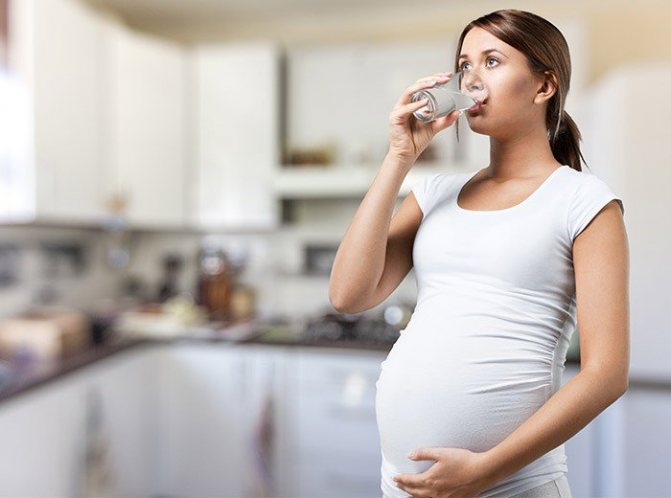
The following foods and dishes should prevail in the diet:
- clear broths;
- lean varieties of fish and meat;
- fermented milk products: cottage cheese, soft cheeses, kefir, fermented baked milk, Varenets;
- puree soups;
- fresh fruit and vegetable salads;
- dried white bread;
- cereal porridge;
- hard cookies.
It is necessary to exclude from the daily menu products containing essential oils: spicy fresh herbs, radishes, radishes. And also all legumes - soybeans, beans, peas, lentils.
Drug therapy
Belching during pregnancy is rarely so severe that medications are used to eliminate it. But they are necessary for the treatment of diseases that provoke it.
What drugs are included in treatment regimens most often:
- probiotics - Acipol, Linex, Bifiform, Bifidumbacterin;
- prebiotics - Enterol, Duphalac;
- defoamers - Espumisan, Bobotik;
- enterosorbents - Polyphepan, Polysorb.
Extremely rarely, in case of urgent need, women are prescribed prokinetics (Motilium, Passazhix), which prevent the development of rotting and fermentation processes. They effectively eliminate the symptoms of flatulence - belching, nausea, vomiting, diarrhea, constipation.
Diet recommendations
Heartburn and nausea at 38 weeks and later require not only drug treatment, but also dietary adjustments. Experts believe that if a pregnant woman follows a diet from the moment of conception, she has a better chance of avoiding digestive problems, which are sometimes difficult to get rid of.
A burning sensation occurs when a woman eats in too large portions, as at this time an increased amount of gastric juice is produced. To solve the problem and get rid of discomfort, it is enough to switch to fractional meals. Soups, cereals, meat and side dishes should still serve as main courses, and light snacks are introduced between meals. For this purpose, they eat natural yoghurts, fresh fruits that do not provoke allergies, and it is useful to make salads from vegetables.
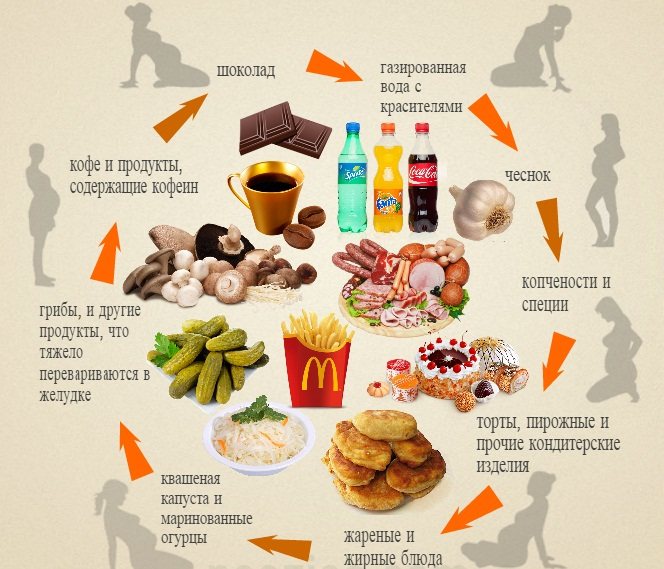
Treatment of heartburn also involves a number of dietary restrictions. The symptom appears if the menu includes foods that provoke an increase in the level of acidity inside the stomach or negatively affect the integrity of the mucous membranes:
- sour fruits and berries;
- spices;
- vinegar;
- canned food;
- sauces;
- smoked meats.
All of the foods listed should be excluded from the diet during pregnancy. This measure is designed to help avoid burning, sour belching and stomach pain.
There are foods that can help treat the burning sensation. Dairy products are considered useful for increasing acidity. They are consumed if they do not cause intestinal upset and are well absorbed by the body. In the last weeks of pregnancy, it is recommended to include fruit jelly in your diet. It is enough to drink one glass to protect the mucous membranes from destruction and saturate the body with vitamins.
Heartburn in pregnant women is a common condition that causes discomfort to women. If discomfort occurs occasionally, then there is no need to do anything. If the sensations become intense, treatment must begin.










